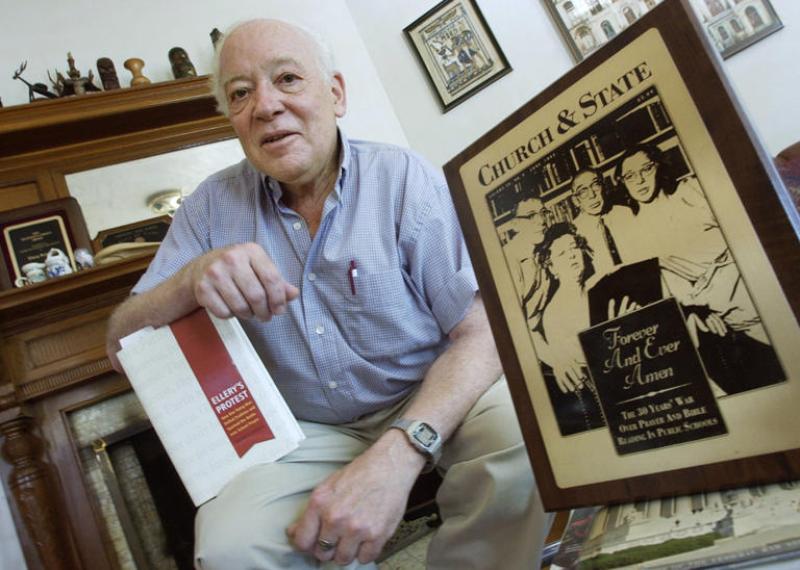His 1956 complaint about Bible-reading in school changed history. He says things are worse now.
By: Michelle Boorstein
Seed via MSN. Original article from The Washington Post.

In 1962 and 1963, the U.S. Supreme Court issued a pair of rulings that historians say were pivotal in shaping the relationship between religion and the public square. In 1962 the court ruled that school-sponsored prayer violated the Establishment Clause of the First Amendment of the U.S. Constitution, which bars the government from establishing or promoting any specific religion. The following year, on June 17, 1963, the court ruled similarly against school-sponsored Bible readings. Ellery Schempp was the Pennsylvania public high school junior whose complaint about the readings eventually came to the court. Schempp, 82, is a retired physicist and activist for church-state separation. We spoke to him about the case and our current climate.
Q: In the mid-1950s, you were a teen living with your siblings and parents in suburban Philadelphia. You attended a Unitarian Church where major public theologians including Norman Thomas and Reinhold Niebuhr would speak. You say there was a “church on every street corner” and your church and family — your father was spiritual and your mother was a freethinker — made you unusual. How was prayer woven into the school day when you were a kid?
A: The teachers would read from the Bible at the start of the day when we were in lower grades. By middle school, you’d walk in and someone would say: ‘It’s your turn to read the Bible.’ It was always the King James version. Whoever was reading would pick it up, open it at random, mumble through, close it, and then all the kids would stand, say the Lord’s Prayer and do the flag salute. I kind of regarded it as silly.
Q: How did you shift from thinking it was silly to something that seriously bothered you?
A: There were relatively few Jews in our district, but I did have a number of friends who were Jewish who were clearly uncomfortable. On Christmas and Easter, antisemitic passages were read. The whole idea was discriminatory, and in ways most people don’t even think of. Even the idea of people reading the Bible aloud was very Protestant; it was a slap in the face to Catholics, as usually the priest would read the Bible and interpret it for Catholics.
I had always been interested in science, and to have people in school reading about Genesis and Noah’s flood — I felt: This is just awful. I remember my physics teacher referred to the Bible as being the equivalent of ‘good science.’
Q: The Bible readings were required by a state law that had been in effect since 1913. In high school you decided to do something about it.
A: In 1954 is when Brown v. Board of Education [of Topeka, the U.S. Supreme Court case that declared segregation in public schools unconstitutional] happened and it gave me the idea that the Supreme Court could remedy injustice. Lots of things were in the air.
My dad was always concerned with social justice, and he knew about the ACLU, which was very significant. I remember typing a letter to them on Dad’s typewriter. The letter is in the National Archives, with Dad’s letterhead. It said: “As a student in my junior year, I’d very greatly appreciate any information you might send regarding possible [ACLU] action and/or aid in testing the constitutionality of a Pennsylvania law which arbitrarily (and seemingly unrighteously and unconstitutionally) compels the Bible to be read in our public school system. I thank you for any help you might offer in freeing American youth in Pennsylvania from this gross violation.”
Q: The District Court ruled in your favor in striking down the state law requiring Bible verses be read at the start of the day in public school. The school district appealed, and the Pennsylvania legislature in the meantime amended the statute to allow parents to exempt their children. But your family continued the lawsuit, and your case was eventually merged with that of the famous atheist Madalyn Murray O’Hair, who sued after her son was required by Maryland law to participate in school prayer. The Supreme Court in 1963 ruled that school-sponsored prayer and Bible reading are unconstitutional. What do you remember from the time around the verdict, by which point you were in your 20s and heading to graduate school?
A: The immediate reaction was people were outraged. Congress held weeks of hearings to support an amendment to the Constitution. The [far-right] John Birch Society was very active and were threatening to impeach [Supreme Court Chief Justice] Earl Warren. My family got 5,000 letters to our home. One-third in support, one-third against us but reasonable and one-third were hateful and threatened violence. Some were smeared with excrement. Roger [my little brother] was roughed up in school and some parents told their children not to play with Donna [my little sister], and that really hurt her.
Q: You became a physicist and geologist and went on to work on fiber optics, the development of MRI systems and nuclear waste, among other things. Through your life, how did your involvement in the case impact you?
A: My dad became a very important activist. As for me, very few noticed it. If I was applying for a job I wouldn’t highlight it in my résumé, it was so controversial. Only when I retired around 2000 I joined with organizations like Americans United for the Separation of Church and State, Freedom From Religion and other groups. I believe very fervently that the separation of church and state is extremely important to preserve our democracy, so we don’t become like Afghanistan, Pakistan and Russia where politicians wrap selves in religion. There is no place in the Constitution that mentions anything about the commandments, bibles; it doesn’t even ask for divine providence.
The Declaration of Independence isn’t part of our law. It’s not in the Constitution. No court decisions rely on it. People cite it as evidence and it’s not so.
The Bible never once mentions voting, democracy, freedom of speech or even freedom of religion. The idea that we’re based on biblical principles is just ludicrous, it’s just not so.
Q: What would your father think of church-state relations in 2023?
He was very upset watching [the rise of the Religious Right, starting in the 1980s and 1990s]. They distorted the whole concept of Christianity. The whole concept of church and state together are incredibly powerful.
The Bible is not a source of science. It never made discoveries in math and science. It didn’t make any important discoveries.
Q: You say the protests that once greeted you when you’d speak in public aren’t really a thing anymore. How has the country changed on the topic of religion and government?
A: Right-wing Christian organizations are bringing in hundreds of millions of dollars a year through fundraising for their advocacy and lobbying organizations, this is a total distortion of what freedom of religion was supposed to mean. The Supreme Court’s recent decisions are all about eclipsing the Establishment Clause in favor of the Free Exercise Clause. I’ve gotten to the point where I say I don’t believe in freedom of religion anymore. It’s become so ridiculous. People today are saying ‘I have a very sincere belief, I don’t believe in red lights, and where is my freedom?’
I believe in freedom of belief, and no violence against people with different ideas. But this idea that anyone who claims to have a sincere religious belief is allowed to violate civil society? I can’t agree with them.
It’s getting worse because of Donald Trump and MAGA types, but it’s been brewing for a long time.
More Americans identify as religious “nones” [having no religious affiliation], and I thought more skepticism was a good sign, but it didn’t take over in the way I had hoped it would. Now we’re saying ‘I’m spiritual but not religious!’ That’s not a firm commitment to the separation of church and state.
Trolling, taunting, spamming, and off topic comments may be removed at the discretion of group mods. NT members that vote up their own comments, repeat comments, or continue to disrupt the conversation risk having all of their comments deleted. Please remember to quote the person(s) to whom you are replying to preserve continuity of this seed. Any use of the phrase "Trump Derangement Syndrome" or the TDS acronym in a comment will be deleted.








We seem to be going backwards.
Can you give us examples of that?
... the republican party today.
Read the article...
He is a good man and earned an honorable place in American history.
Absolutely and he should not be forgotten.
I will say it explicitly, religious people can kiss my god damned ass. Fucking pieces of shit need to sit down and shut the fuck up.
Fucking messed up in the head deranged lunatics.